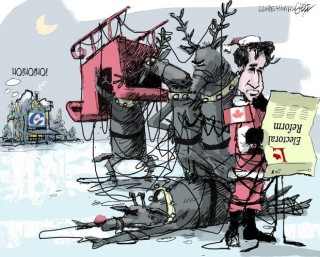It sounds like a clear and unequivocal stance: The Canadian government “does not and will not pay ransom to terrorists.”
Prime Minister Justin Trudeau made that noble-sounding statement this week. His predecessor, Stephen Harper, had made the same declaration years earlier.
Yet, Canadian hostages have still been mysteriously released by terrorists – and not because of their “beautiful blue eyes,” as former hostage Robert Fowler once admitted. The federal government has repeatedly denied that ransoms were paid for the release of any hostages in recent years, but there is mounting evidence to undermine this claim.
Beyond the official rhetoric, much depends on the definition of “ransom.” If a payment can be called something else, terrorists can still receive money and other benefits from Canada, according to those who have been involved in the negotiations.
Amanda Lindhout, held hostage in Somalia from August, 2008, until November, 2009, described one such Canadian strategy. In exchange for releasing her and Australian hostage Nigel Brennan, their captors were offered a $250,000 payment – “an amount that had been put together by the Canadian and Australian governments and was technically categorized as ‘expense’ money so that each country could maintain its official policy of not paying ransoms,” Ms. Lindhout wrote in her memoir, A House in the Sky.
The captors rejected the offer, and Ms. Lindhout was not released until the families of the two hostages were able to cobble together a bigger payment.
In the same year, Canadian diplomats Robert Fowler and Louis Guay were released by a faction of al-Qaeda in the deserts of northern Mali, after four months of captivity. The Globe and Mail later reported that the release was arranged in exchange for a large cash payment and the release of four terrorists from Mali’s prisons.
Senior members of Mali’s government told The Globe they were under heavy pressure from Ottawa to find a way to free the Canadian diplomats. Mali is one of the biggest recipients of Canadian foreign aid, and its officials said they didn’t want to jeopardize this flow of money.
A northern Mali politician who became the intermediary in the ransom negotiations, Baba Ould Sheik, told The Globe that he had many meetings with Canadian officials to discuss the negotiations.
The federal government has never commented on the Malian or Somali negotiations, except to repeat its blanket denial that it never pays ransom. But when the two diplomats were freed, Mr. Harper said he wasn’t commenting on what “other governments” might have done.
And in the case of the two diplomats, several other governments had an interest in helping Canada. These included the governments of Mali and neighbouring Burkina Faso, along with Germany and Switzerland, since a German hostage and a Swiss hostage were released at the same time as the Canadians. Money could have been paid to the hostage takers by one of these governments as a favour to Canada, or in exchange for political or economic considerations.
The United States and Britain, which have made strong public statements about never paying ransoms, have pressured Canada to adopt the same hardline stance. Both governments were reportedly displeased when they learned of the money paid for the release of the two Canadian diplomats.
Despite the repeated denials from Ottawa, there has been mounting evidence of a ransom payment in the Fowler and Guay case. The evidence came from confidential U.S. diplomatic cables, and from al-Qaeda documents that were discovered when the terrorist group was forced to retreat from northern Mali.
In a leaked 2010 memo, the U.S. ambassador to Mali complained that Canada and European countries were inflicting “dramatic” damage on regional security by paying ransom to the hostage takers. “It is difficult to level criticism on countries like Mali and Burkina Faso for facilitating negotiations when the countries that pay ransom, like Austria and Canada, are given a pass,” the ambassador said in the leaked memo.
Other U.S. memos reported that Canadian officials were heavily involved in the negotiations. After the release of the two diplomats, the home village of the Malian intermediary, Mr. Ould Sheik, enjoyed “an enormous influx of cash” that was probably because of his share of the ransom payment, one memo said.
Another U.S. memo said a senior Libyan official, former intelligence chief Musa Kusa, criticized Canada’s actions. The diplomats were released “in return for a ransom payment” and this “increased the strength of al-Qaeda,” he told the Americans.
In 2013, after the terrorist groups were pushed out of northern Mali by a French and Malian military force, an Associated Press reporter discovered an al-Qaeda document that further confirmed the Canadian ransom payment.
The letter, signed by the leaders of the North African branch of al-Qaeda, said Canada had paid about $900,000 (U.S.) for the release of the two diplomats. This was a “most meagre price” for such significant hostages, the document complained.
GEOFFREY YORK
JOHANNESBURG — The Globe and Mail
Published Wednesday, Apr. 27, 2016 7:50PM EDT
Last updated Wednesday, Apr. 27, 2016 7:51PM EDT

